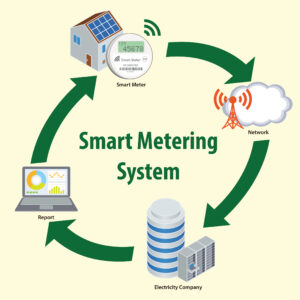By now, most Americans have likely heard of the “smart grid.” This phrase is being used to describe the computerization of America’s electrical infrastructure. The purpose of this computerization is to improve the reliability, efficiency, resiliency and security of the electric grid. 
A key component of the smart grid is an advanced metering infrastructure, also known as AMI in the utility world. AMI systems utilize digital meters as well as computer technology to measure electric use at homes and businesses more precisely than was possible with analog meters. The digital meters communicate via radio or the existing power lines and have been loosely termed as “smart meters.” AMI benefits electric co-op members with greater accuracy in billing, faster outage restoration, operational savings versus manual meter reading and detailed data that you and your co-op can use to manage electric use much more accurately.
Unfortunately, a number of myths have developed over the years concerning smart meters. These myths can be classified into three categories: privacy concerns, security and health effects. Let’s take a look at each, starting with privacy.
Your cooperative takes great pains to keep your information private – and that information includes the details of your electric use. The only people who see that data are co-op employees and you. Your co-op will not release this information to anyone else without your specific permission. The myths are that the data collected can tell when you are home or away and exactly what you are doing when you are there and that this data is being given to the government. Naturally, the data will show when you are home because for most families, energy consumption is higher then. But having said that, the current smart meter cannot identify what activities are taking place down to the specific appliance in use. This myth is simply unfounded.
What about the myth that these meters actually make the electric grid less secure by providing an avenue for hackers to break into systems through the smart meter and wreak havoc? While hackers continually attempt to break into electric systems, their focus is at higher levels in the operation. Hacking a meter is unlikely for a variety of reasons. Hackers like to work remotely via the Internet, and smart meters don’t offer that option. Radio-based smart meters require the hacker to be nearby to catch the weak communication signal, break the proprietary communication protocol and to be there for extended periods of time to collect the short burst of data sent. Therefore, smart meters are an unlikely and unprofitable target for hackers.
Finally there are the myths surrounding smart meters and ill effects on health. These concerns state that having the radio-based smart meter is the equivalent to having a cell tower attached to the side of your home. Again, this is unfounded. Let’s look at why. Number one is that they communicate intermittently for as few as five minutes a day. These devices are regulated by the Federal Communications Commission, and their output is well below the levels this Federal agency sets. As one doctor observed, the radio waves emitted are more like those of a cordless phone or wireless router. Radio waves emitted by smart meters are much weaker and less frequent than other sources we use on a daily basis.
We will all benefit from the continued development of America’s smart grid and can rest easy with the knowledge that the rumors surrounding radio-based smart meters don’t hold water.
Tom Tate writes on cooperative issues for the National Rural Electric Cooperative Association, the Arlington, Va.-based service arm of the nation’s 900-plus consumer-owned, not-for-profit electric cooperatives.









